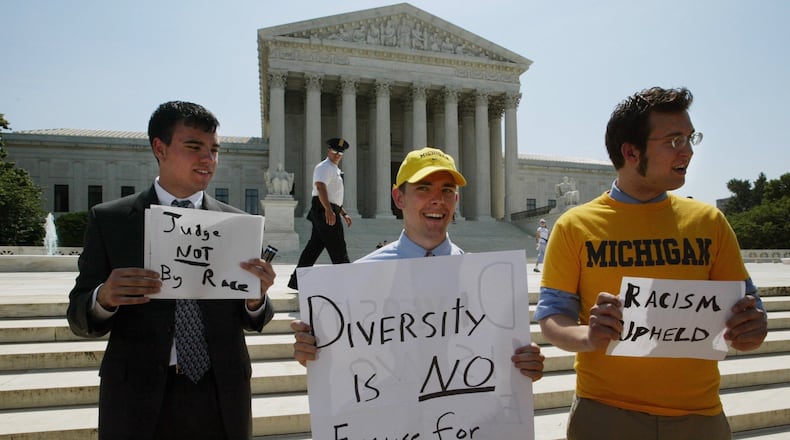The U.S. Supreme Court will take up the ever-contentious issue of race in college admissions. Critics of race-conscious admissions contend that student merit — as manifest in test scores and grade-point averages — should be the determining factors.
But GPAs and test scores have never been the only factors. If they were, many colleges would have far fewer winning football seasons.
An Atlanta Journal-Constitution investigation found the 2014 freshman class at Georgia Tech had an average SAT score of 1445. However, for incoming football players, the average SAT was 420 points below the class as a whole. Gaps were also found among athletes at the University of Georgia, Georgia State and Georgia Southern. The annual survey of admitted students by the Harvard Crimson found recruited athletes in the class of 2025 had an average SAT score of 1397, while non-athletes averaged 1501.
Yet, no one protests when colleges accept athletes who, without a golden throwing arm or a record-breaking time in the 400-meter dash, would likely never have made the final cut under admissions based only on academic performance.
Nor do people complain because colleges seek gender balance in their admissions to avoid overwhelmingly female campuses. In the spring of 2021, women comprised 59.5% of all U.S. college students. The growth in women pursuing degrees has been occurring for more than 40 years — a byproduct of a job market where good positions for women require more education.
Colleges understand neither young women nor young men want to attend a school that’s nearly all female. You will often hear laments about the lopsided ratio, for example, at the University of Georgia, where 58% of undergraduates are female.
In the case that will now be heard by the Supreme Court, Students for Fair Admissions argues that Harvard gives Asian American applicants lower personal ratings and holds them to a higher academic standard. The group also sued the University of North Carolina for giving an admissions edge to Black, Hispanic and Native American applicants over whites and Asian Americans.The affirmative action approaches of both universities prevailed in lower courts, and a federal appeals court ruled for Harvard in 2020.
In her 2019 decision upholding Harvard’s policies as lawful, Federal District Court Judge Allison D. Burroughs said the Ivy League private school assigned extra admissions points to a range of applicants, including sought-after athletes, offspring of donors, legacies, minorities or residents of an underrepresented area. Burroughs said these admissions advantages — referred to as “tips” by Harvard admissions — are not limited to race, and include leadership and creative ability, along with geographic, economic and ethnic factors.
Critics of affirmative action contend that no one is helped when colleges admit “unqualified” candidates based on race or ethnicity. But the students are not unqualified. Yes, their test scores may be lower, but still indicative they are capable of doing well. As the judge wrote in the Harvard case, “Every student Harvard admits is academically prepared for the educational challenges offered at Harvard.”
In fact, the edge given to Black and Hispanic applicants was not as great as that given to recruited athletes, wrote Burroughs, noting that most of the extra points assigned in Harvard admissions “disproportionately benefit individuals in the majority and more affluent group.”
A December 2020 study co-authored by University of Georgia professor Josh Kinsler examined the preferences Harvard gives for recruited athletes, legacies, those on the dean’s interest list, and children of faculty and staff. Among white applicants who earned admission, more than 43% had such admission advantages. The researchers predicted three-quarters of them would have been rejected if Harvard had treated them as typical white applicants. Among admits who were Black, Asian American, and Hispanic, the share with those admission advantages was less than 16% each, according to the study.
Yet, it’s race that riles people and leads to court challenges. Not the edge given to a senator’s son or a major donor’s granddaughter. Not the boost provided male candidates at a campus seeking gender parity. Not the leeway on SAT and ACT scores afforded athletic recruits.
And we never seem to ask why.
About the Author
The Latest
Featured



